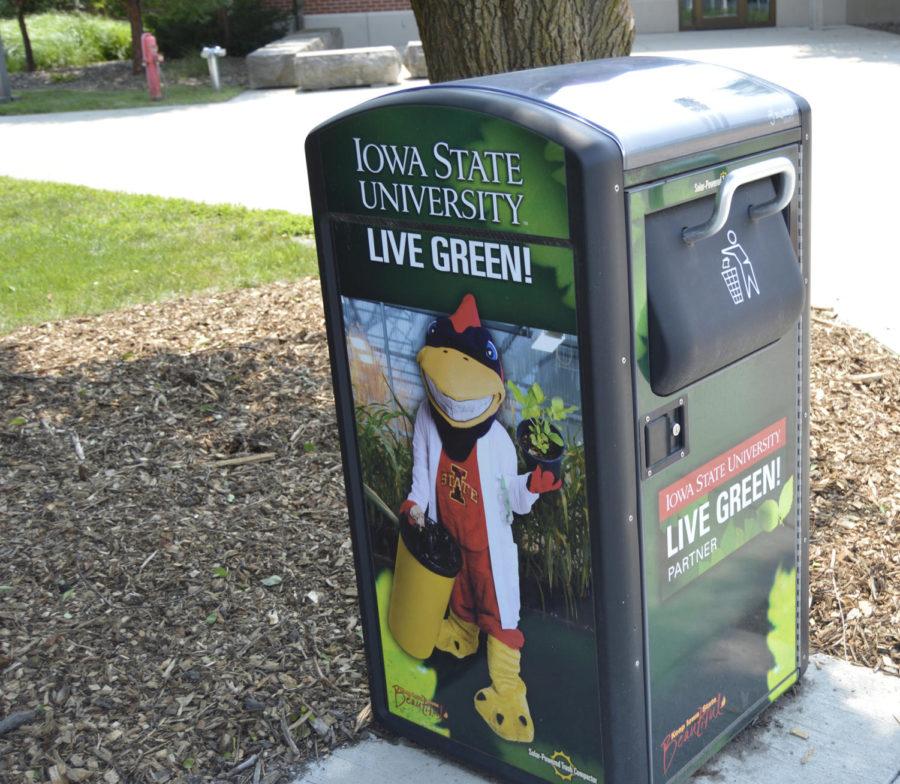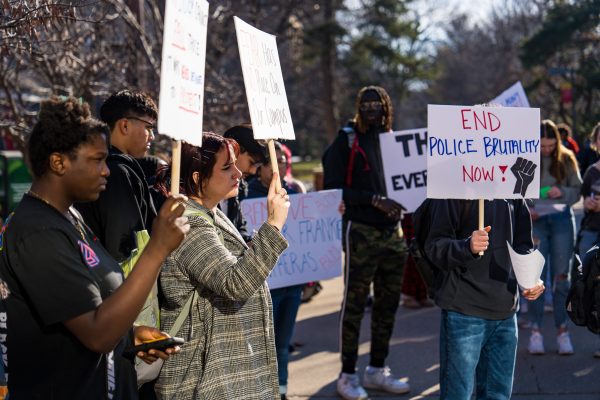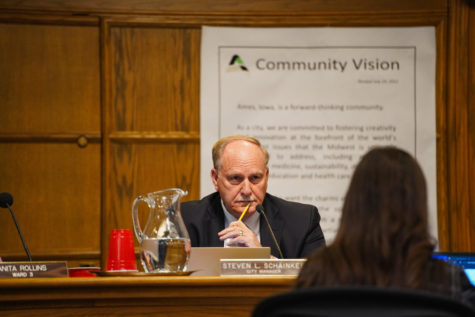Ames City Council explores future of trash hauling
By Matthew Rezab, [email protected]
Recycling trash cans are placed all over campus are part of the LIVE GREEN! initiative at Iowa State.
The Ames City Council approved three steps regarding trash hauling and waste-to-energy options and one step to investigate in their workshop Tuesday where one local hauler said the conversations “scared the hell” out of him.
The council approved directing staff to solve construction and demolition debris challenges, develop a closer partnership with Metro Waste Authority and start a pilot drop-off recycling program. The council also approved investigating the next steps regarding organized collections. Both votes were unanimous on a vote of 5-0. At-large Rep. Amber Corrieri was absent.
Assistant City Manager Brian Phillips said for the workshop, city staff were reconciling many plans and influences such as the Waste-to-Energy Options Study, Organized Collection report, Climate Action Plan and Central Iowa Solid Waste Management Association Comprehensive Plan.
“What we’re trying to do is figure out how do we reconcile all of the different influences that surround how we deal with solid waste,” Phillips said. “That’s why this workshop became larger than simply a follow-up to the Organized Collection report.”
According to city documents, possible next steps regarding organized collections include pay-as-you-throw rates, eliminating the requirement for twice-weekly residential collection, dividing the city into zones and then having haulers bid on zones to serve and requiring landlords to furnish garbage service rather than tenants.
Ames Public Works Director John Joiner said Ames is currently serviced by seven haulers that are not bound by certain districts in the city.
“The most consistent concern that was brought up amongst the haulers, with a zone and organized collection system, is the customer choice going away,” Joiner said. “They all felt that they provide exceptional customer service, and they like to use that connection with their customers to build their customer base.”
At-Large Rep. Bronwyn Beatty-Hansen voiced concern for sustainability within the city.
“There are a number of reasons that if we organize our collection it’s better for sustainability, and I don’t mean just literal greenhouse gas emissions,” Beatty-Hansen said. “You have sustainability in terms of the wear and tear on the streets, and that’s an economic sustainability issue.”
Ward 2 Rep. Tim Gartin said the council should consider the businesses in their decisions.
“We want to do something that serves the community broadly well, but we also want to be mindful that these are people who made investments in equipment,” Gartin said. “They made that with the anticipation that there would be certain work.”
Taylor Eichinger said his company, Garbage Guys, has invested around $2.5 million into Ames, including $250,000 in garbage cans.
“It scares the hell out of me to be a business owner and a garbage operator in the city of Ames right now just based on the talks that you guys are having,” Eichinger said.
Carl Arends, the president at Arends Sanitation, said he has around 1,500 customers in Ames, and all of their carts could require cleaning for $10 to $20 each.
“If we go with the zone, you got 1,500 carts that we have to figure out what we’re going to do with to clean,” Arends said. “You’re not going to take a dirty cart from one place and take it to another.”
Mayor John Haila said that hauling is a very complicated system.
“I’m just concerned that there’s a lot of details [and] moving parts, and we’re just not in the trash business in terms of understanding how all those things work,” Haila said.
When discussing construction and demolition debris challenges, Ward 1 Rep. Gloria Betcher said the problem is only going to get worse if Ames has more construction.
“It’s a little bit odd because we’ve been saying how slow our construction has been over recent years, and yet Boone County is already experiencing challenges,” Betcher said.
Phillips said Ames does produce a substantial quantity of construction and demolition material, and this poses a lot of challenges.
“Just on a personal note, every day when I drive home there are a lot of semi trucks taking the old Ames High School to Boone County piece by piece for months,” Phillips said.
Haila said that contractors do divert if possible which may be the case for the old Ames High School.
“Concrete and brick is considered clean material and can be used for filling ravines and the like too, so contractors are not anxious about paying $70 [per] ton for all that,” Haila said. “They do divert a lot of that and try to find places where they can legally dispose of it.”
According to city documents, the Central Iowa Solid Waste Management Association Comprehensive Plan allows Ames to use the Boone County Landfill for construction and demolition debris and will expire in 2025.
In discussing developing a closer relationship with the Metro Waste Authority, Haila said that they “probably have the highest technological facility in the nation.”
“You know when you go to fast food and you get a cardboard holder for cups?” Haila said. “Well, they’re all made up in Clear Lake I think, and they only buy paper from Des Moines Metro Waste Authority because the paper is so clean and is such a high quality.”
Additional Measures
The council unanimously approved a resolution confirming the appointment of Emily Roberts and Jian Janes as Iowa State University Student Government representatives of the Ames Transit Agency Board of Trustees.
Roberts, a senior in chemical engineering, is president of the Iowa State Student Government. Janes, a junior in management information systems, is a Student Government senator representing the College of Business.
Your donation will support the student journalists of the Iowa State Daily. Your contribution will allow us to purchase equipment, send our student journalists to conferences and off-set their cost of living so they can continue to do best-in-the-nation work at the Iowa State Daily.

















